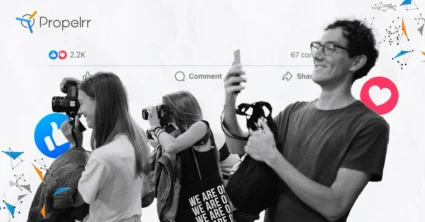What’s Publicity in Marketing and is “Any” Kind Really Good?
Author & Editor
Content Team Lead
Published on: Jan 6, 2022 Updated on: Mar 19, 2025

A single tale can change your brand’s path overnight. And this is how publicity promotion works - having your brand as the bait on the tittle-tattles of the public. But how would you know if you’re getting the right kind of buzz?
As a digital marketing company, we’ve looked into the cruces and trifles of publicity in every marketing niche and assembled it in this structured guide.
Publicity can escalate your brand’s or product’s coverage with lesser investments. But if the basic pith of what is publicity in marketing seems like a puzzle to you, things need to be unraveled first. It’s because incorporating this strategy in your marketing mix is like rolling a dice - you’ll never know the outcome, especially when unplanned.
Get one thing wrong, and you could be burning your own bridge through ineffective strategies you’re putting effort on.
Think of publicity promotion as a storm in a teacup. It’s where you’re getting more awareness and coverage by simply having your audience discourse about your brand by themselves, just like getting user engagement on Instagram through written articles and reviews.
While publicity in marketing is an efficient public relations (PR) tactic to win exposure, it has its own implied limit - a metric you should be aware of. So it’s vital for you to know where to aim in the publicity spectrum - should you stick to positive publicity or consider negative publicity too? Well, there’s no such thing as bad publicity, or are there?
We’ll answer all these questions for you so let’s discuss.
What is publicity in marketing?
Publicity is the process of managing the movement of information to the public through stories, events, blogs, or any other means to generate awareness to the broader audience. It is a non-paid form of promotion that generates viral blows on various media channels, leaving you no control over the message and the information.
The process is basically getting your brand visible to the public through publicized content in trustworthy news and media outlets that are created by reporters, columnists, and journalists. Unlike advertising, publicity induces outcomes by solely using press releases and pitches, not on paid advertising spaces.
Publicity can also be used to enhance your PR. It’s a powerful way to augment the relationship between your company and the public simply by drawing more attention to the topical stories and activities of your brand.
Why is publicity important?
While publicity is known to create brand awareness, it has more extensive objectives which revolve around the idea of organically building the brand’s image. Rather than focusing on promoting a product or service, publicity materials emphasize the process of escalating the brand’s reputation to further stimulate interest and demand.
This image is strategically taken care of not only for the prospective product users but also for the employees, partners, investors, and other stakeholders.
How does publicity work?
Creating brand awareness through publicity doesn’t demand you to purchase a commercial time and space. Rather, it solely controls the news coverage about your brand on publicized content. This strategy requires you to control the information on the word of mouth that would be tattled by the general public, so there’s a way for you to somehow provoke your desired outcome.
You may appoint publicists to manage your public profile by inducing newsworthy and positive stories of your company and products to be published in other media outlets like press releases, news, and digital media.
What are the different types of publicity?
The key element of having effective PR is through choosing the right kind of publicity. Remember that publicity isn’t anything similar to traditional advertising where you can state only the favorable qualities of your brand in sparkles. There are crucial considerations before going for a step that exposes your brand to the public or you’ll be flushing your prior investment on the wrong drain.
Below are the examples of publicity you need to differentiate before getting that publicity spotlight.
1. Based on user sentiments
- Positive publicity. These are publicized content that contains good reviews about a brand. It leaves a positive influence over the total brand reputation and eventually increases interest and demand for a company’s products and services.
- Negative publicity. Opposite to positive publicity, this type of publicity publishes content that causes loss to the company while having increased public coverage. This can also potentially lead to the collapse of the brand’s current demand and damage to its PR.
2. Based on news dissemination
- Digital Activity. This is through getting public attention through digital media activities like optimizing Facebook posts, Instagram images, TikTok videos, tweets, and comments.
- Self-promotion. This is the best way to create an image of authority in your field. You can share your knowledge and expertise in publicly disseminated stories where you can indirectly promote your brand and yourself as a credible source.
- News. Let any newsworthy event be heard by any crowd by diving into the news media. Share changes in policies, upcoming events, or any issue that could generate buzz in the public.
- Press release. If you want to notify the public about any newsworthy event, product launches, or changes in your business, press releases are the most efficient way. It's a short news story with brief information about the event or product that can immediately pique the interest of the target audience.
- Networks. This is a process of interacting with others within the media and generating your own social contacts. You’ll not only trade ideas within your niche but you can also keep in touch and gain mutual trust outside your field.
- Volunteer. Involve yourself and your company’s name in the topical and even the unremarkable events in the industry. Attend local events, join community service projects, and get involved in charity drives so you’re getting more ears and eyes to meet your brand.
- Product release. This practice alerts the public and builds anticipation for the product launch. It creates great momentum for the public to be enticed for the upcoming release.
- Offers. Launching enticing offers can develop consumers’ interest by word of mouth triggered by real end-user experiences.
- Partnerships. Creating connections with other businesses raises your chance to be heard and seen by their audience, too. This process doesn’t only widen your company’s scope but is also a great way to charm investors.
- Marketing Communications. This is when paid marketing practices generate organic sentiments over the public. As an example, you may think of an advertisement that spawns reviews from analysts, public figures, or news media.
- Events and Conferences. These are used by companies to get good and desired coverage on news stories that are specifically casting the brand and particular product.
Is negative publicity good?
A study conducted to compare New York Times Book sales suggested that there was a significant raise in an author’s sales by more than 45% after receiving negative feedback from literary critics.
This ultimately suggests that yes, negative publicity is still publicity. Even after receiving negative reviews from the literary critics, the book sales haven’t dropped and revolted up. Having people aware of the product tempts the public to have their own knowledge and opinion about it.
By increasing awareness about a brand or product to a broader audience - even the absence of commendatory praises from critics - brands can still get higher chances of enticing the public to want their products.
Nevertheless, it’s up to you to use negative publicity to your advantage. Big companies often avoid this as it can spell disaster that won’t just die out overnight. Sometimes, it would generate more ripples that would negatively affect the brand, in general.

Benefits of publicity to your business
If you’re opting to get your brand involved in the public through publicity, here are some benefits you can expect:
- Increase your brand’s credibility. People often trust the testimonials of the third party so publicity articulates higher levels of credibility than advertising. This is because media channels like newspapers, magazines, and accredited publications are regarded as professional critics and are free from bias or exaggeration.
- Attract your target market. With a broader audience to be exposed to, the higher your chances of attracting your target customer. Thereby, increasing the rate of capturing leads for your business.
- An economical promotion. Without demanding large financial investments, publicity is a cost-effective medium to get the attention of the broad public.
- Build your brand image. Publicity is one of the best methods to build public relations, too. Credible reviews from publications can build bridges that guarantee a worthy reputation in the public.
Key takeaways
Publicity stunts spread like a wildfire so it’s imperative for any business to have a thorough understanding of the process. Getting the right tales about your business could be tricky but with properly planned pitches, you can trigger desired outcomes. To get you along, we’ve summarized all you need to know about publicity:
- Publicists act like the middleman in the publicity process. The news stories published by professional critics speak on behalf of the brand but are free from bias or exaggeration, unlike advertising.
- Publicity translates to getting your brand involved. Most types of publicity disseminate information about your business through joining social events and mingling with the public.
- Optimize publicity to build credibility over your brand’s image. You can use your public practices to foster trust from the public and build your reputation.
What kind of publicity are you opting to try out to garner that public attention for your brand? Share it in the comments section or give us a ring in our Facebook, X, or LinkedIn accounts!
For more stories on publicity and other digital marketing strategies, subscribe to the Propelrr newsletter and get them straight in your inbox.
